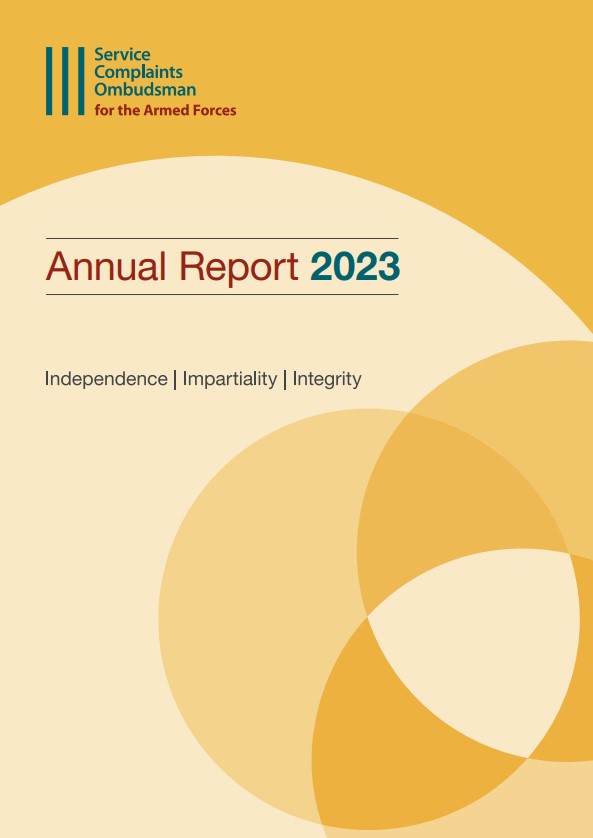ARMED FORCES COMPLAINTS SYSTEM STILL NOT EFFICIENT, EFFECTIVE OR FAIR - BUT REAL CHANGE IS POSSIBLE, SAYS OMBUDSMAN
-
Improvements have been made to the efficiency and perceived independence of the system.
-
However, the system lacks flexibility, and concerns remain over various aspects of the system.
-
The Ombudsman has not made any new recommendations to enable the Ministry of Defence to focus on delivery of open recommendations.
The Service Complaints Ombudsman for the Armed Forces (SCOAF), Mariette Hughes, has assessed that the Service Complaints system continues to operate in a way that is not efficient, effective or fair in her 2023 Annual Report that was laid in Parliament today.
This is the eighth year in a row that this assessment has been reached.
Key issues which continue to affect the operation of the Service Complaints system include the time taken to resolve appeals, a lack of trust and confidence in the system, and there remains serious concerns around the experiences of those who have cause to raise complaints about bullying, harassment and discrimination.
The Ombudsman welcomes improvements made to the system this year. The independence of the system has continued to improve following the removal of the Chain of Command from the Service Complaints system.
There have also been improvements to the efficiency of the system with the Armed Forces closing 74% of Service complaints on time, their best performance to date. While performance is not yet in line with the KPI, the target is within reach.
The Ombudsman has not made any new recommendations this year. This is to ensure the recommendations made in the Ombudsman’s 2022 Annual Report are implemented and given sufficient time to embed, as the Ombudsman believes these recommendations will form the basis of lasting change.
Statement from the Service Complaints Ombudsman for the Armed Forces, Mariette Hughes:
Whilst I remain unable to say that the Service Complaints system is efficient, effective or fair, this has been another year of significant improvements. All three Services have engaged with each other and with my office in a positive and meaningful fashion this year, seeking to identify areas for improvement and achieving the best performance against KPIs to date.
I have not made any further recommendations in this report, in order to allow the agreed recommendations from 2022 to take effect and deliver real and lasting change. Whilst there remain areas to work on, I do believe that the system is improving, and will continue to do so. However, we will only achieve the vision of an efficient, effective and fair Service Complaints system if we continue to work and drive for change together.
Highlights of the report are:
The performance of the Service Complaints system in 2023:
-
1,225 Service Complaints were ruled admissible.
-
74% of complaints were closed within 24 weeks (tri-Service target).
-
The average Service Complaint takes 22 weeks to process.
-
39% of Service Complaints are upheld (partially or fully) in favour of the complainant.
-
The 3 largest areas of complaint concerned:
-
Career management (35%).
-
Bullying, harassment or discrimination (21%).
-
Pay, pensions and allowances (12%).
-
Female Service personnel remain overrepresented in the Service Complaints system, making up 20% of complaints but only 12% of the Armed Forces.
The work of SCOAF in 2023:
I
-
SCOAF made 174 referrals to help current or former Service personnel access the Service Complaints system, of which 100% were made within the time target.
-
SCOAF received 499 applications for investigation, of which 90% were eligible for investigation.
-
SCOAF completed 100% of investigations within the time target (received in 2023).
-
SCOAF continued to reduce the backlog, despite an increase in the number of Maladministration and/or Substance applications.
SCOAF Annual Report 2023
Annual Report 2023
